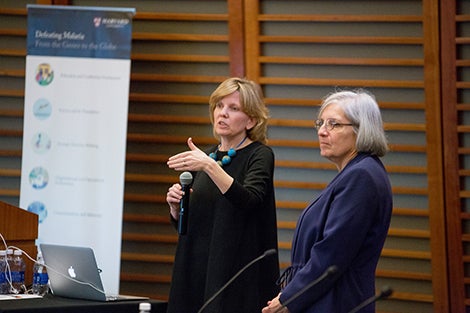April 12, 2016 — While the world is as close as it has ever been to having a malaria vaccine, the fight to eradicate the disease is far from over. That was the consensus among experts in the field who gathered at a forum hosted by Harvard’s Defeating Malaria: From the Genes to the Globe initiative on April 6, 2016. Focused on the latest research in vaccine development for infectious diseases, the event highlighted the promise and limitations of RTS,S, the first malaria vaccine candidate to win regulatory approval.
Development of RTS,S began in the 1980s at GlaxoSmithKline, which later partnered with international nonprofit PATH on the effort. Recent clinical trials found that the vaccine provided modest immunity for older babies, although that protection waned over time. While its performance has been less than ideal, the burden of malaria is so high—214 million cases each year and 438,000 deaths, primarily in children in Africa, according to the World Health Organization (WHO)—that this vaccine can still have a significant impact, experts say. The European Medicines Agency approved RTS,S last July, and in January, WHO released a position paper recommending large-scale pilot implementation of the vaccine.
Dyann Wirth, Richard Pearson Strong Professor of Infectious Diseases and chair of the Department of Immunology and Infectious Diseases at Harvard T.H. Chan School of Public Health, gave opening remarks at the forum, which was held at Harvard Medical School’s Joseph B. Martin Conference Center.

Panelists including Ashley Birkett of the PATH Malaria Vaccine Initiative and Lynda Stuart of the Bill & Melinda Gates Foundation, spoke about why development of RTS,S and the second-generation malaria vaccine candidates now in the pipeline has taken so long. A key challenge is that the Plasmodium parasite is a complex and highly adaptable foe. Panelists called for better trial designs to more quickly determine which vaccine candidates are most viable. And while there is a lot of excellent work underway in this field, panelists observed that it can be challenging to get vaccine candidates past the “valley of death” of funding, regulatory, and political hurdles.
As with malaria, an effective vaccine is critical for eliminating tuberculosis (TB). While the vaccine BCG has been used to fight the disease for decades, its protective effect is limited. The scientific community does not know how to make a better one yet, said Sarah Fortune, professor of immunology and infectious diseases at Harvard Chan School. She outlined research showing that the antibody profiles of people with latent and active TB are different, which affects the way they respond to vaccines. This points to a need for a new way of looking at protective immunity, she said, as well as better ways of testing vaccines.
Stuart, a former faculty member at Massachusetts General Hospital and Harvard Medical School, called on Harvard scientists to leverage the current public interest in global health—along with the Longwood Medical Area’s considerable resources—to advance work in human immunology.
Photos: Sarah Sholes
Read more: Dissecting the power of a historic vaccine (Harvard Chan School News)
